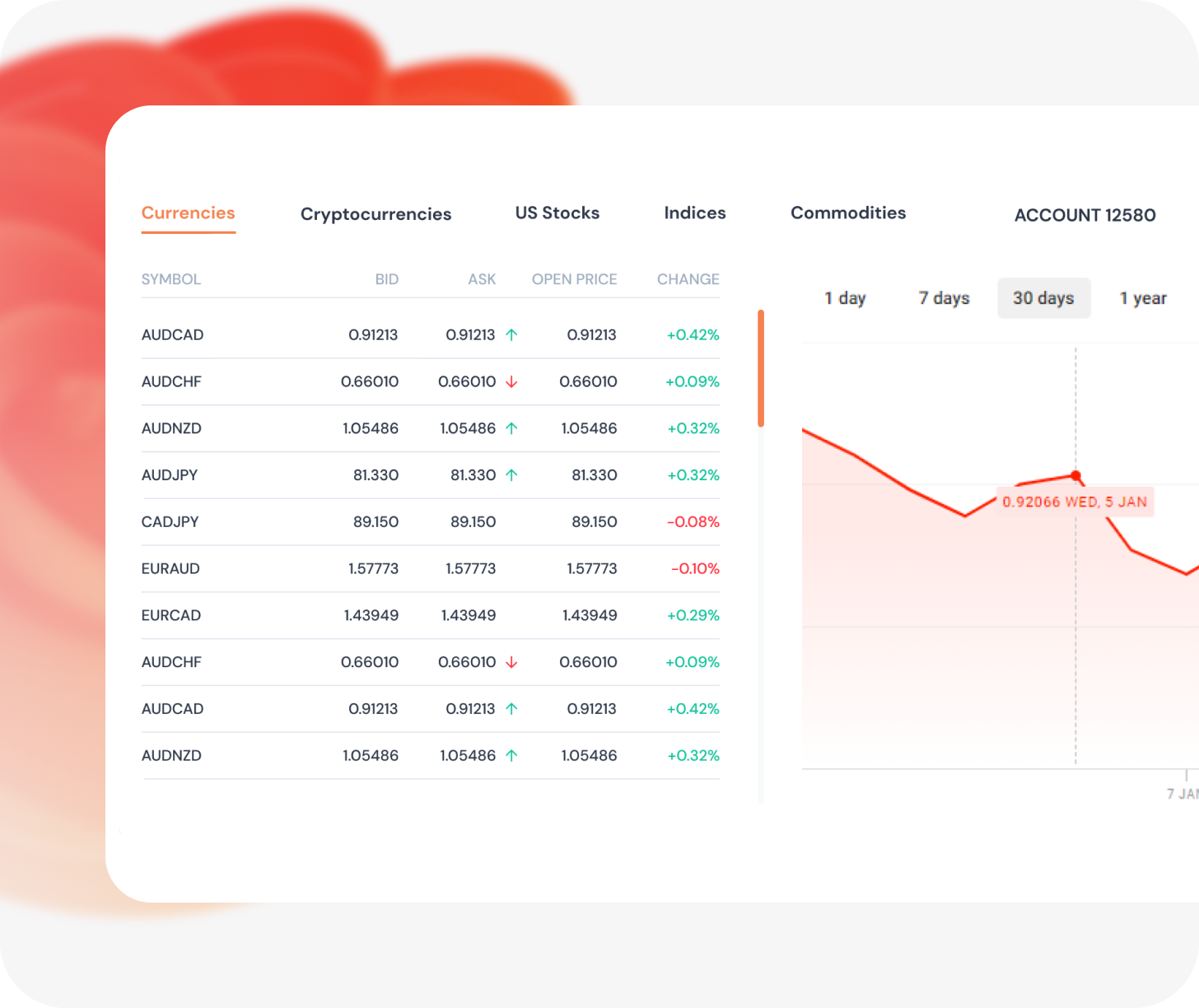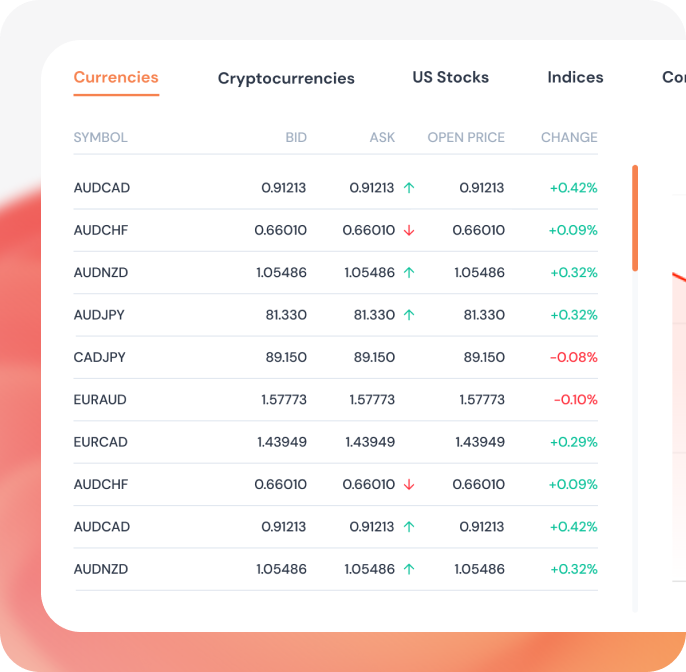
Reveal
Potential
Reach the heights of trading with us! We offer a wide range of trading accounts suitable for traders of all levels.
Get Started
First steps
How to Start Earning
1step
Think
Consider several ways to earn money on the exchange. Assess their advantages and disadvantages. Choose among them the most suitable for you.
2step
Choose
Find several tools on our platform for investing and choose among them the most suitable one. Register and open a minimum deposit.
3step
Earn and Learn
Try different approaches, learn from your actions, gain experience. Analyze your steps, work on your mistakes, improve your skills and strategies.
Features
Open a World of New Financial Opportunities
Investments
Explore a wide range of trading instruments, carefully selected for their high liquidity, allowing you to make optimal investment decisions.


Analytics
Gain access to exclusive market research empowering you to learn how to predict chart movements alongside our team of traders.


VIP Club
Join an international community of traders and unlock privileges that are typically unavailable to the majority of market participants.


Safety
The real-time margin calculation system reflects the market revaluation of all client positions, ensuring an accurate risk.


Explore a variety of options and trade with confidence, taking advantage of global market trends and making informed investment decisions.



Custom reports
Personalized Reports Customized for Your Needs
Every trader has unique requirements for analyzing and monitoring their trading activity. That's why our company provides customized reports specifically tailored to each client's needs. Our team of professionals works closely with traders to create personalized reports that highlight performance metrics, market analysis or visualization of specific data.
Personalized support
Comprehensive Support Service for Every Trader
Our company prioritizes effective communication with clients, providing a professional support service to address all financial inquiries related to trading. Our team of experts is always available to assist with any questions and ensure seamless trading experiences.



News
Stay Up to Date With the Trends and Happenings

13.02.2026
Robinhood Makes Notable Confirmation about Ripple and XRP Ledger
Ripple's Breakthrough in Real-World Asset Tokenization
Ripple has achieved a monumental milestone by successfully tokenizing hundreds of millions of dollars in real-world assets (RWAs) on the XRP Ledger (XRPL). This development has been confirmed by Robinhood in a recent report, positioning XRP as a pivotal platform for large-scale digital asset operations. This move not only underscores Ripple's capabilities but also highlights the potential of blockchain technology in modernizing financial markets.
Understanding Tokenization in the Financial Landscape
Tokenization is the process of converting physical and financial assets into digital tokens. By placing RWAs on the XRPL, Ripple enhances transparency, efficiency, and liquidity for investors. This technological advancement facilitates more secure and faster transactions while providing greater accessibility to a broader array of investors.
The Strategic Shift in Digital Asset Operations
Robinhood's report of Ripple's success in the tokenization space signifies a growing adoption of XRP for serious financial operations beyond the realm of traditional cryptocurrency trading. The ability to tokenize real-world assets allows institutions and individuals to engage with assets such as real estate and securities in a more streamlined manner, breaking down barriers and democratizing investment opportunities.
Ripple's Growing Influence Among Institutional Players
The XRP Ledger has captured the attention of institutional investors and firms, reflecting Ripple's potential to handle large-value transactions with reliability. This interest is part of a larger trend where major financial institutions are exploring asset tokenization. This includes assets such as real estate, money market funds, and treasuries, areas that have traditionally required extensive paperwork and longer settlement times.
The Implications of Ripple's Success
Steph Is Crypto (@Steph_iscrypto) has emphasized the scale of Ripple's achievements, suggesting that this move could open new investment avenues and capital deployment methods. By integrating RWAs onto the XRPL, Ripple illustrates the ledger's capacity to support sophisticated financial structures while ensuring speed and security, key components for modern financial systems.
Competitive Landscape in Tokenization
The tokenization space is rapidly evolving, with other major firms such as Goldman Sachs launching initiatives focused on real estate and money market funds. Analysts like McKinsey & Co. predict that the market for tokenized funds could be valued at $2 trillion by 2030, excluding other asset categories. Ripple stands out in this landscape due to its operational scale and the adoption of the XRPL by financial institutions aiming for greater settlement efficiency and enhanced reporting capabilities.
Unlocking New Investment Potential
Ripple's successful tokenization of hundreds of millions of dollars in RWAs paves the way for increased participation from both institutional and retail investors. Tokenization on the XRPL can significantly reduce transaction costs, speed up settlement processes, and generate liquidity channels not previously accessible to the average investor. This democratization of asset investment is crucial for the evolution of financial markets.
XRP's Strength in Digital and Traditional Finance
This advancement also solidifies XRP's position as a foundational digital asset. Its utility in high-value tokenization projects is proof of the network’s dual capability to support both speculative trading and tangible financial applications. This duality positions XRP and the XRPL as key components in the bridging of traditional finance with the burgeoning digital markets.
Robinhood's Vision of the Future Financial System
According to Robinhood's report, the XRPL is evolving from being a mere medium for cryptocurrency transactions to a robust platform for tokenized real-world assets. As Ripple expands its tokenized asset offerings, the relevance and potential of XRP in the global financial system are likely to grow, ushering in a new era of financial integration and innovation.
Concluding Thoughts on Ripple's Milestone
Investors and financial institutions are increasingly viewing the XRP Ledger as a critical tool for bridging traditional and digital finance markets. This signals a transformative phase of adoption and innovation for Ripple, marking a significant step forward in the integration of digital assets into the conventional financial landscape.

11.02.2026
Fugitive Daren Li sentenced to 20 years in the U.S. for $73M international crypto scam
The Unraveling of a Complex Crypto Scam
In the intricate and often opaque world of cryptocurrency, where fortunes can be made and lost with the flick of a coin, the recent sentencing of Daren Li stands as a stark reminder of the potential perils inherent in this burgeoning financial ecosystem. An alarming $73 million international crypto scam has been attributed to Li, who, despite being sentenced in absentia, remains a fugitive. This article delves into the methodical execution of this scam, exploring the implications for victims and the broader cryptocurrency community.
The Man Behind the Scam: Daren Li
Daren Li, an individual holding dual nationality from China and St. Kitts and Nevis, orchestrated a sophisticated criminal enterprise that exploited the anonymity and global reach of cryptocurrencies. By leveraging centers in Cambodia, Li and his co-conspirators executed what is known as a "pig butchering" crypto scam, a term that highlights the cyclical nature of luring victims with false promises before ultimately defrauding them.
Cambodia: A Hotbed for Crypto Fraud
Cambodia, as highlighted by reports from TRM Labs, has surfaced as a central hub for crypto fraud, generating a staggering $30 million daily through compounds where forced laborers execute scams. Astonishingly, since 2021, over $96 billion in cryptocurrencies have flowed through companies linked to Cambodia, predominantly for nefarious activities such as money laundering and fraud. The implications of such a volume of fraud are profound, undermining trust in legitimate crypto investment opportunities and complicating regulatory efforts worldwide.
The Modus Operandi: Exploiting Human Connection
Li's operation, as revealed during court proceedings, was alarmingly personal. The scam hinged on the power of social engineering, where victims were contacted under the guise of building professional or romantic relationships. Using fake platforms, the perpetrators convinced victims they were making genuine crypto investments. In some cases, the fraudulent scheme employed deception through fake tech-support scenarios, tricking victims into transferring funds under the pretense of solving fictitious computer issues.
Global Efforts to Combat Crypto Crime
As articulated by Assistant Attorney General A. Tysen Duva, global collaboration is crucial to dismantling crypto fraud networks and bringing perpetrators like Li to justice. Beyond just finding Li, these efforts aim to restore the financial losses incurred by victims and prevent future incidents. The coordination between international law enforcement agencies underscores the recognition that cryptocurrency scams are not confined by borders, demanding a unified global response.
Lessons and Implications for Crypto Users
Social engineering scams remain a formidable threat, accounting for nearly 41% of all crypto security incidents by 2025. This statistic serves as a cautionary tale for both novice and seasoned investors in the crypto market. Users are urged to adopt vigilant digital habits, such as verifying the authenticity of platforms and communication channels, and employing robust security measures to protect their digital assets.
Conclusion: Navigating the Risks of Cryptocurrency
The saga of Daren Li and his criminal network is a microcosm of the broader challenges facing the cryptocurrency sector. While the decentralized nature of these digital assets presents unparalleled opportunities, it also poses significant regulatory and security challenges. As the market continues to evolve, so too must the measures to safeguard against such egregious exploitations. Ultimately, fostering an environment of transparency and accountability will be pivotal in ensuring the sustainable growth and integrity of the crypto space.

09.02.2026
Exploring Private Cryptocurrency Swaps Beyond Traditional Exchange Verification
The Paradox of Cryptocurrency Anonymity
One transaction can reveal more about an individual than one might anticipate, as it can expose their habits, preferences, and financial behavior. Initially, cryptocurrency was heralded as a paradigm of privacy, but as it turns out, most networks are not as opaque as they were thought to be. This paradox has heightened the urgency for methods to regain anonymity. The rise of anonymous crypto exchanges can be seen as a testament to the growing consciousness regarding privacy in digital asset transactions in the contemporary world.
Emerging Havoc in Online Trails
Using a crypto wallet inevitably leaves a digital footprint, which can be traced by analysts utilizing blockchain explorers and forensic tools. Governments, corporations, and hackers are increasingly keeping tabs on these trails for a variety of reasons. Users have come to recognize that financial privacy is rapidly eroding without appropriate protective measures. This understanding fuels the allure of platforms viewed as anonymous crypto exchange alternatives, promising secure trading experiences.
Why Face-to-Face Transactions Require Verification
Centralized platforms are subject to stringent regulations, which necessitate identity verification processes, document submissions, and ongoing activity monitoring. While these measures are effective at deterring fraud, they significantly compromise the user's privacy. Many traders are uncomfortable with the repeated provision of personal information online. This is why there is growing interest in methods that permit individuals to transfer XMR without KYC, preserving anonymity.
The Role of Monero in Privacy-Centered Trading
Monero, with its intrinsic privacy features, represents an alternative to other cryptocurrencies. Technologies such as ring signatures, stealth addresses, and confidential transactions serve to obscure the details of senders, receivers, and transaction amounts. These attributes make Monero particularly appealing to individuals who prioritize anonymity. Consequently, there is a rising number of services enabling individuals to transfer XMR without KYC, thus protecting their identities.
How Anonymous Platform Operations Differ
Unlike centralized exchanges, privacy-oriented platforms limit data harvesting and typically avoid maintaining transaction history records. These platforms function as direct swap services rather than custodial wallets holding user funds. This operational model reduces the risks associated with data breaches and surveillance. Such is the structure that a reputable anonymous exchange offering XMR no-KYC services should uphold for its users today.
The Privacy of Swaps: Advantages and Liabilities
Companies enabling traders to engage in XMR transactions without KYC deliver superior confidentiality, expedite onboarding processes, and impose fewer bureaucratic hurdles. Nonetheless, users should comprehend the responsibility that accompanies this liberty. Implementing secure wallets, utilizing trusted websites, and practicing vigilant transaction habits are essential. While privacy tools are designed to shield identity, foul play or negligence might lead to the unintended disclosure of information.
The Future of Decentralized and Private Exchanges
There is a strong likelihood that privacy-respecting solutions will represent the future of cryptocurrency trading. Users are increasingly embracing both speed and convenience while also valuing autonomy, control, and anonymity. Continuous innovations seek to enhance decentralized interchange mechanisms without sacrificing usability. The growing popularity of anonymous crypto exchange models signifies a broader trend towards privacy-first financial ecosystems globally.
Conclusion
As digital finance evolves, privacy concerns are reshaping transaction methodologies within blockchain networks daily. Platforms facilitating anonymous swaps are garnering attention as more individuals become aware of them and seek efficient, secure trading experiences within decentralized ecosystems. An example of this is ghostswap.io, where traders can explore privacy-related swapping options, while also learning about the responsibilities that accompany anonymous cryptocurrency transactions and best practices in digital asset management.
Related Items: Private Cryptocurrency Swaps, Traditional Exchange Verification

06.02.2026
Paderborn: Free Internet Safety Advice - Safer Internet Day 2026 - News Directory 3
The 23rd Annual Safer Internet Day in Paderborn, Germany
This year's Safer Internet Day, hosted in Paderborn, Germany, marks the 23rd annual observance of this global initiative aimed at encouraging the safe and responsible use of technology. With the theme "Smart tech, safe choices - Exploring the safe and responsible use of AI," the focus is on how artificial intelligence is increasingly melding into our daily online and offline lives. This initiative underscores the importance of navigating AI technologies safely, regardless of age.
Empowering Through Guidance and Support
In light of the rising cyber threats and complexities ushered in by AI, the Paderborn Police Department's Criminal Prevention/Victim Protection unit is stepping up by providing free telephone consultations on internet security. To coincide with Safer Internet Day, Criminal Chief Commissioners Simone Höing and Dietmar Kluthe will be accessible for anyone looking to broaden their understanding and enhance their defenses against cyber-risk elements.
Addressing a Wide Range of Digital Safety Concerns
The scope of the consultations spans numerous security concerns. From identifying phishing schemes and understanding cryptocurrency trading risks to adopting robust password strategies and practicing responsible online behavior, the Paderborn Police Department aims to empower users to confidently navigate the digital realm. This pragmatic approach seeks to instill a sense of security in users as they interact with digital platforms.
Understanding AI: The Central Focus
AI has permeated various aspects of life, from educational aids to work environments. The need to comprehend both its advantages and potential dangers is emphasized in this year's Safer Internet Day. The initiative aims to arm users with essential skills to make informed choices during AI interactions, including fostering critical thinking, safeguarding personal privacy, and cultivating ethical AI use.
A Global Movement Towards Digital Safety
Paderborn's efforts are part of a wider global movement led by Insafe and INHOPE, with the European Commission and other international partners. Organizations such as 2simple.com and the Cyber Safety Project are actively providing free educational resources for schools. These resources assist educators in weaving cyber safety and AI literacy into their teaching, preparing students to tackle digital age challenges.
The Sophistication of Cyber Threats
The increasing complexity of cyber threats calls for a proactive safety approach. Phishing scams remain a significant threat, coaxing users into sharing confidential data. Meanwhile, the unregulated nature of cryptocurrency trading platforms poses notable risks for investors. Fundamental security measures, such as complex, unique passwords and multi-factor authentication, are highlighted as essential defenses. Furthermore, responsible social media use points toward understanding privacy settings and the potential consequences of online interactions.
Practical and Actionable Advice
The consultations aim at providing practical, easy-to-implement advice. Criminal Chief Commissioners Höing and Kluthe are committed to delivering actionable tips that individuals can immediately incorporate to heighten their online security. Interested participants can reach out through the designated consultation line during specified hours.
Collective Responsibility for a Safer Digital Environment
Safer Internet Day is fundamentally about cultivating collective accountability for safer online spaces. It encourages open, inclusive conversations about life in the digital realm, with a focus on ethical and responsible technology use, particularly concerning AI. Through awareness, education, and community collaboration, Safer Internet Day endeavors to empower individuals and communities to enjoy the internet’s benefits while minimizing its risks.
Towards a Safer and Better Internet
The US Safer Internet Day page emphasizes not just creating a safer internet but a better one, where technology usage is marked by responsibility, respect, critical awareness, and creativity. This broader goal highlights the significance of digital citizenship and the ongoing dialogue about the evolving challenges and opportunities that the digital frontier presents.






